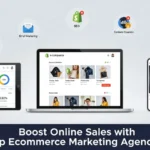
Introduction
In today’s digital age, consumers are constantly bombarded with marketing messages. To stand out, brands need to move beyond generic campaigns and embrace personalized digital marketing strategies. Personalization, which tailors offers and messages based on individual customer preferences and past interactions, enhances customer satisfaction, boosts brand loyalty, and improves marketing campaign efficiency. This blog post explores how to leverage customer data, marketing automation, and emerging technologies like AI to create personalized experiences that resonate with your audience. Are you ready to transform your marketing approach?
Unify Customer Data with a Customer Data Platform (CDP)
To truly personalize marketing efforts, brands must first unify their customer data. A Customer Data Platform (CDP) acts as a centralized hub, aggregating data from various sources, including website interactions, email campaigns, social media engagements, and purchase history. This 360-degree customer view enables marketers to understand individual behaviors, preferences, and needs, laying the foundation for effective personalization. With a CDP, marketers can make data-driven decisions, ensuring that every customer interaction is relevant and timely. According to Insider, a CDP is a great resource for marketing personalization because it holds data on all touchpoints and interactions a customer has with your company.

Leverage Marketing Automation for Personalized Engagement
Personalization is essential to the success of your marketing strategy. Pairing personalization efforts with marketing automation allows you to engage with your customers across channels consistently and efficiently. In an omnichannel approach to personalization, customer data is constantly shared between various parts of a brand’s marketing stack. This, combined with the right strategy and martech solutions, enables marketers to tailor each part of a customer’s journey to their characteristics, preferences, and previous interactions, resulting in a fully integrated and consistent experience. As highlighted in our previous post on AI marketing strategies, integrating technology can significantly enhance your marketing outcomes. Isn’t it time to make your marketing smarter?

Implement AI-Driven Customer Segmentation
Brands have more customer data than ever before—but without AI, it’s just noise. Leveraging AI to analyze customer data, automate content delivery, and optimize campaigns in real time, brands can move beyond static, one-size-fits-all marketing to create meaningful connections with their audiences. Marketers can use AI-generated insights to craft emotionally resonant campaigns that adapt to audience preferences in real time. Relevant content is more impactful, fostering deeper brand engagement and loyalty. By using AI, brands can improve customer experiences. Aprimo emphasizes that AI is key to delivering seamless, scalable, and highly effective personalized marketing strategies. It transforms raw information into meaningful actions that fuel personalization.

Personalization Tactics and Examples
Personalized Email Marketing
Personalized email marketing involves tailoring email content to individual customer segments based on their preferences and behaviors. Segmentation is a planning tool for personalized marketing. To personalize content, you need to take it a step further. Some examples of customer segments to use for marketing personalization include age groups, occupations, spending amount tiers, product interest categories, and date of the most recent purchase. Once you have your different customer segments set up, tailor your messaging and offers according to the qualities and characteristics of each segment. According to Bazaarvoice, personalized email marketing takes customer segments and then individualizes content for the members of that segment.
Create Customer Segments
Collecting and organizing customer data is only half the battle. The next step is putting that data to use with different types of personalized marketing campaigns and tactics. Individual data sources also offer insights into your customers. These include social media and SEO management software, e-commerce and retail point of sale (POS) systems, and Google Analytics. These platforms will give you insights on customers who visit your website, engage with your brand on social media, and purchase your products or services. As Digitalshift a leading digital marketing agency, recommends, leveraging these insights is crucial for effective customer segmentation.
Omnichannel Marketing
In an omnichannel marketing strategy, each step of a customer journey gets triggered by contextual events and accounts for customers’ existing behaviors and preferences. As we discuss in our omnichannel marketing automation guide, this approach has three massive benefits over standard multichannel marketing. Every company has a different amount of experience with personalization. Regardless of where you may be, the steps below are a good starting point for working toward omnichannel marketing personalization. Insider’s guide on omnichannel personalization highlights that a customer data platform is critical for making fast data-driven decisions in this approach.
Conclusion
Personalized digital marketing is no longer a luxury but a necessity for brands seeking to thrive in today’s competitive landscape. By unifying customer data with a CDP, leveraging marketing automation, and employing AI-driven insights, brands can create tailored experiences that resonate with individual customers, fostering loyalty, driving customer engagement tactics, and ultimately boosting brand personalization strategies. Embracing these strategies will enable you to move beyond generic marketing and build meaningful connections with your audience. Digitalshift Pvt Ltd specializes in data-driven strategies to convert visitors into loyal customers through services like app marketing and SEO.

Frequently Asked Questions (FAQ)
Q: What is a Customer Data Platform (CDP) and why is it important for personalized marketing?
A Customer Data Platform (CDP) is a centralized platform that aggregates customer data from various sources, providing a 360-degree view of each customer. This unified data enables marketers to create highly personalized marketing campaigns by understanding individual behaviors, preferences, and needs. A CDP ensures that every customer interaction is relevant and timely, leading to increased engagement and loyalty.
Q: How does marketing automation enhance personalized marketing efforts?
Marketing automation allows brands to consistently and efficiently engage with customers across multiple channels. By pairing personalization with marketing automation, you can tailor each part of the customer journey to their specific characteristics and previous interactions. This results in a fully integrated and consistent experience, improving overall customer satisfaction and driving better results. Consider exploring how adsense optimization can further boost your revenue, as discussed in our guide adsense optimization.
Q: What role does AI play in personalized marketing strategies?
AI transforms raw customer data into actionable insights, enabling brands to create emotionally resonant campaigns that adapt to audience preferences in real-time. AI-driven personalization helps in customer segmentation, content delivery, and campaign optimization, ensuring that marketing efforts are highly relevant and impactful. By leveraging AI, brands can move beyond static, one-size-fits-all marketing and build meaningful connections with their audience. Discover how to improve marketing ROI with AI, as detailed in our comprehensive guide.
Q: What are some effective personalized marketing tactics that brands can implement?
Effective personalized marketing campaigns include personalized email marketing, where email content is tailored to individual customer segments based on their preferences and behaviors. Other tactics include creating detailed customer segments based on various data points, such as age, occupation, spending habits, and product interests. Additionally, omnichannel marketing ensures a consistent and personalized experience across all digital touchpoints.
Q: How can brands ensure they are ethically using AI in their personalized marketing strategies?
Brands must ensure they are transparently collecting and utilizing customer data while maintaining trust. Leveraging Customer Data Platforms (CDPs) and Customer Relationship Management (CRM) tools with built-in AI can help ensure compliance and data security while still delivering high-value personalization. Ethical AI usage involves respecting customer privacy, providing clear opt-in options, and using data responsibly to enhance the customer experience without being intrusive.
Additional Resources / References
- Learn more about Customer Data Platform (CDP).
- Explore the benefits of AI in marketing.
- Read Adobe’s insights on marketing personalization.
- Discover how to achieve omnichannel personalization.
- Build a successful personalized marketing strategy with Bazaarvoice.
- Forbes discusses the power of personalization.
Ready to transform your marketing with data-driven strategies? Contact Digitalshift today for expert guidance on personalized digital marketing and customer engagement tactics.



